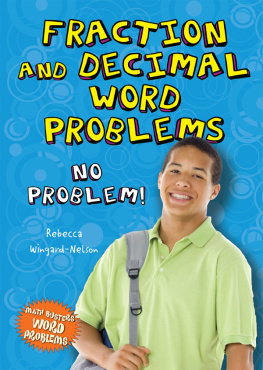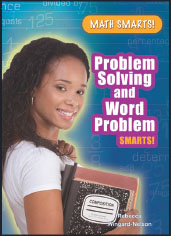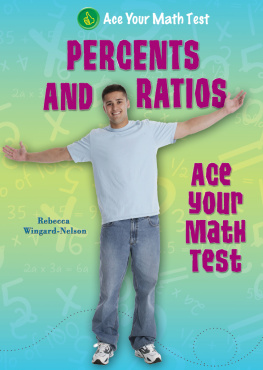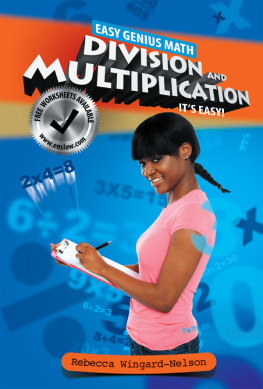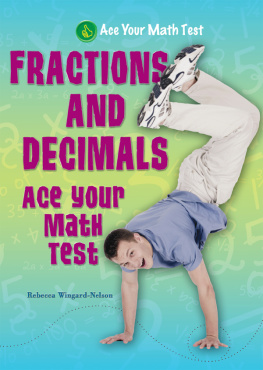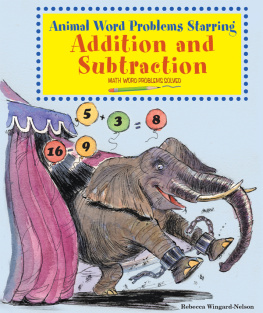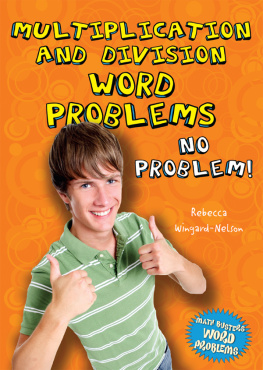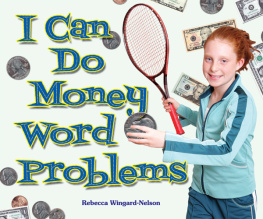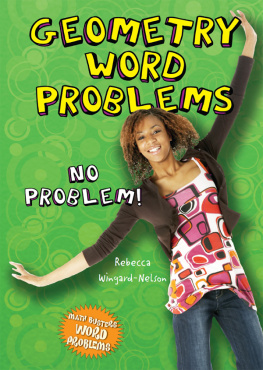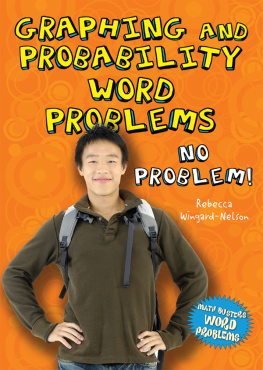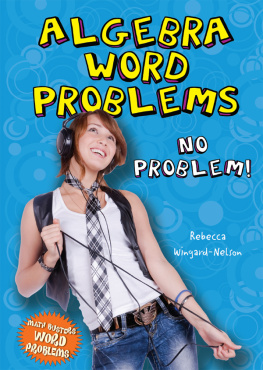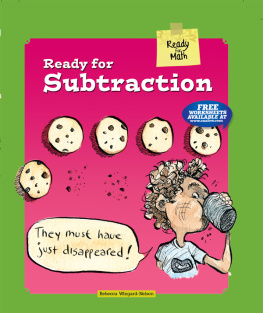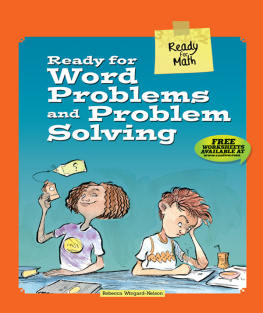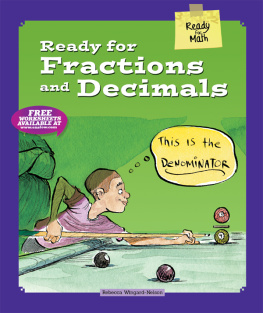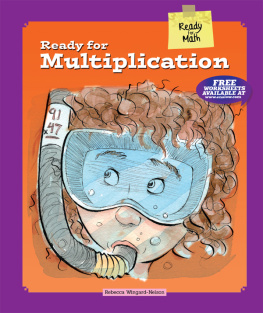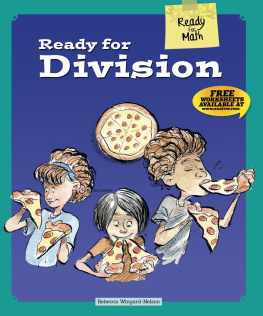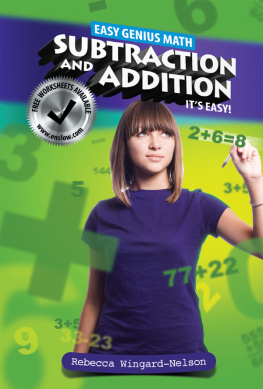Having a problem with word problems? This book introduces simple ways to tackle tricky word problems with fractions and decimals. Real world examples make the book easy to read and great for students to use on their own, or with parents, teachers, or tutors.
FREE WORKSHEETS AVAILABLE AT ENSLOW.COM
"The author does a splendid job of clearly presenting material to help readers practice their problem-solving skills using fractions and decimals."
Patricia Leonard, MS, Series Math Consultant
Middle School Math Teacher
St. Andrew School, Clifton, NJ
About the Author
AUTHOR REBECCA WINGARD-NELSON has worked in public, private, and homeschool mathematics education. She has been involved in various educational math projects, including developing and writing state assessment tests, exit exams, and proficiency tests, as well as writing and editing textbooks and workbooks.

When you cut a birthday cake into eight pieces and then eat one (or two), you've just created the basis for a word problem. Math is everywhere; you just might not realize it all the time because math isn't always written as a math problem.
This book will help you understand how fractions, decimals, ratios, and percents are used in word problems. The step-by-step method can help students, parents, teachers, and tutors solve any word problems. The book can be read from beginning to end or used to review a specific topic.

Image Credit: Shutterstock
How do I start? What do I do if I get stuck? What if the answer is wrong when I check it? Word problems are hard for me!

Image Credit: Comstock/PunchStock
Solving mathematics problems is not a spectator sport. You can watch a swim meet. But for you to learn how to swim, you must get in the water. The same is true for math word problems. You have to practice solving the problems! You may watch how others solve them, but try to solve them for yourself, too.
Even the most gifted athlete or musician will tell you that in order to play well, you must practice. The more you practice anything, the better and faster you become at it. The same principal applies to problem solving. Solve more problems, and you become better at solving problems. Homework problems and classwork are your practice.
If you already know everything, there is nothing left to learn. Every mistake you make is a potential learning experience. When you understand a problem and get the right answer the first time, good for you! When you do NOT understand a problem but figure it out, or you make a mistake and learn from it, AWESOME for you!
Ask smart questions. Whoever is helping you will not know what you don't understand unless you tell them. You must ask a question before you can get an answer.
Ask questions early. Concepts in math build on each other. Knowing today's material is essential for understanding tomorrow's.
Stuck on homework? There are many resources for homework help. Check a textbook. Ask someone who does understand. Try looking up sources on the Internet (but don't get distracted). Read this book!
Getting frustrated? Take a break. Get a snack or a drink of water. Move around to get your blood flowing. Then come back and try again.
Stuck on a test? If you do get stuck on a problem, move on to the next one. Solve the problems you understand first. This way, you won't miss the problems you do understand because you were stuck on one you didn't. If you have time, go back and try the ones you skipped.
Wrong answer? Check the math. It could be a simple mistake. Try solving the problem another way! There are many problem-solving strategies, and there is usually more than one way to solve a problem. Don't give up. If you quit, you won't learn anything.
Solving math word problems can be broken down into four steps. You are more likely to get a correct answer and have less trouble finding it, when you follow these steps.

Image Credit: Shutterstock
Read the problem. Read the problem again. This may seem obvious, but this step may be the most important.
Ask yourself questions like:
Do I understand all of the words in the problem?
Can I restate the problem in my own words?
Will a picture or diagram help me understand the problem?
What does the problem ask me to find or show?
What information do I need to solve the problem? Do I have all of the information?
Underlining the important information can help you understand the problem. Read the problem as many times as it takes for you to have a clear sense of what happens in the problem and of what you are asked to find.
Step1: Understand the problem.
Step 2: Make a plan.
Step 3: Follow the plan.
Step 4: Review.
There are many ways to solve math problems. Choosing a good plan becomes easier as you solve more problems. Some plans you may choose are:
| Make a list. | Guess and check. |
| Draw a picture. | Work backward. |
| Use logical reasoning. | Solve a simpler problem. |
| Use what you know. | Use a number line or graph. |
| Use a model. | Use a table. |
| Write an equation. | Use a proportion. |
Once you understand the problem and have decided how you want to solve it, you can carry out your plan. Use the plan you have chosen, but if it does not work, go back to step 2 and choose a different plan.
Look back over the problem and your answer. Does the answer match the question? Does the answer make sense? Is it reasonable? Check the math. What plan worked or did not work? Reviewing what you have done on this problem will help you solve similar problems.
A group of six friends went to an amusement park. Five of them rode on a hanging roller coaster. What fraction of the group rode the hanging roller coaster?

Image Credit: Shutterstock
Read the problem. Are there any words you do not understand? What does the word fraction mean?
A fraction describes part of a whole thing or part of a group. The bottom number (denominator) is the total number of equal parts. The top number (numerator) is the number of parts being talked about.
What does the problem ask you to find?
The fraction of the group that rode the hanging roller coaster.
What information do you need to solve the problem?
You need to know how many people are in the group and how many rode the roller coaster.
Do you have all of the information that you need? Is there extra information?
All of the information is given in the problem. There is no extra information.
This question asks for a fraction. You do not need to perform any operations. Use what you know about fractions and the given information to solve the problem.

